This week may have been the heaviest block of the Soho Horror Film Festival’s Shockdown Saturdays, presenting a super-secret film that can only be classified as extreme. A Little More Flesh certainly left a life-long impression, but the pair of shorts before the night’s first feature was equally powerful.
Beginning with Joseph Catté’s short Ad Lib, we see a karaoke night with some friends turn into a woman’s (Nouritza Emmanuelian) jealousy over a man’s (Thomas Alden) fidelity. Strangely enough, everything is subtitled like we’re supposed to be following the words on the screen. As the two make their way home, the man offers a romantic moonlight gesture of unwarranted singing that is stunningly objected to by the woman’s anger. Through very nuanced direction, it becomes clear that we’re caught in something slightly bigger than just jealousy and that, particularly with the presence of the karaoke styled subtitles, there may be some verbal abuse as The Woman, who speaks English with a French accent, is constantly corrected and threatened by him.
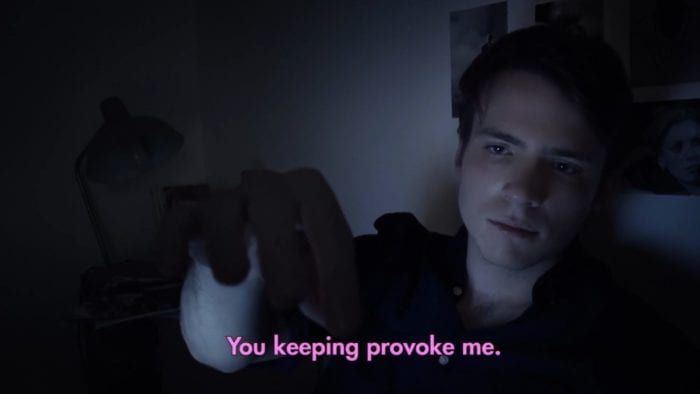
As Ad Lib continues, further subjugation and abuses are uncovered as well as the revelation of the monster that this man is. Joseph Catté uses the subtitles to wonderful effect in Ad Lib, showing abuse can be more than just physical. The Man grabbing the woman’s roommate’s (Pauline Helly) words and punching her in them, causes a reaction of physical distress. It is an interesting take on domestic abuse that feels like we witness the entirety of the relationship from its sweet beginnings to the increasing darkness that unfolds. The ending feels more like a question, though, as we wonder with a simple tenderness if The Woman will return to The Man’s arms again.
The second short, Kelsey Bolling’s The Fourth Wall follows fed-up actress Chloé (Lizzie Brocheré) as she tries to keep her cool through a series of events happening on- and off-stage at a French production of A Midsummer Night’s Dream. Being that the rest of her fellow thespians are unpolished—i.e., unable to say their lines in the language or shagging backstage—Chloé’s rage becomes untethered when her monologue is skipped. The Fourth Wall is a fun reactionary tale about knowing your worth even if it makes you go a little off-book. Featuring a fantastic performance from Brocheré, who fans will notice from American Horror Story: Asylum and Falling Water.
We’ve all heard on-set horror stories about directors being unkind to their actors. Directors explain that they’re attempting to get the best performance out of their actors when in actuality they’re just being horrible towards them. Where stories about Hitchcock going over the line to film Janet Leigh’s infamous Psycho shower scene or Shelley Duvall’s experience of feeling drained by the hundreds of takes Stanley Kubrick shot on certain scenes while filming The Shining certainly grant gravity to memorable scenes, there can be a blurry line of what is directing someone towards their potential and what sort of things can cause irrevocable psychological harm. Sam Ashurst’s A Little More Flesh begins this way, as ’70s erotica director Stanley Durall sits down to provide an audio commentary for his immensely controversial film God’s Lonely Woman.
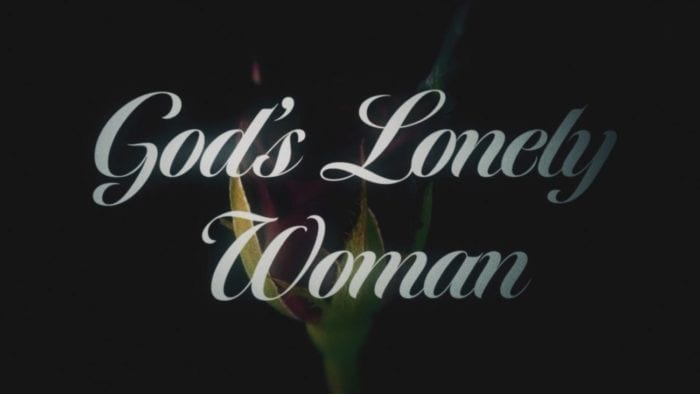
I settled in not knowing what to expect. A Little More Flesh was not a film I had heard of prior to this experience, though many when told the title of the secret film were clamoring excitedly in the festival’s pre-show chat over the reveal. Ashurst introduced the movie, letting the audience know this was going to be “a very challenging film” and that “all of the trigger warnings apply.” As the film started, I was caught off-guard. The surrealist nature of a haunting woman in overexposed hues creeping towards a camera while garbled tones resonated through my speakers felt disconnected to the momentary audibility of Ashurst’s voice trying to figure out his schedule. The disruption doesn’t last long, but long enough for you to take note and question what’s happening.
I’m not sure I’ve ever seen a film use a technique like a director’s commentary as guiding narration for a film. It’s a niche market, but then again so is extreme horror. Ashurst’s voice now introduces himself as director Stanley Durall as A Little More Flesh begins and starts to speak of his fondness for the film within the film, God’s Lonely Woman. Stanley muses over the actors that grace his credits and speaks about how he’ll tell the truth about them, noting that the lead actress, Isabella Dotterson (Elf Lyons), is no longer with us. Stanley also warns us of the film’s controversial ending, noting what critics have surmised to be problematic filmmaking by pompously commenting on the reverence the film deserves, his work falling into a forgotten void like other great directors’ first features, such as Ridley Scott or Christopher Nolan.
Stanley’s arrogance is likely the first thing that becomes quickly prevalent, but as God’s Lonely Woman begins, the audience also witnesses his glaring misogyny. The film quotes Genesis 2:18, “Then the Lord God said, ‘it is not good for man to be alone: I will make for him a helper suitable to him.’” Stanley also speaks to how his father drilled ideals such as this into his head before allowing for the opening scene of a woman sitting in the fetal position, rocking back and forth in a cage. As Stanley informs us that this was actually the last thing shot on set, after the shocking final scene, he implies no wrongdoing when speaking to the audacity critics have in telling him that Isabella was clearly traumatized. Right away, we’re stricken with discomfort and a dread-filled atmosphere. What is awaiting the viewer at the end of the film? What could traumatize an actress to the level of panic being witnessed in the first frames of the movie?
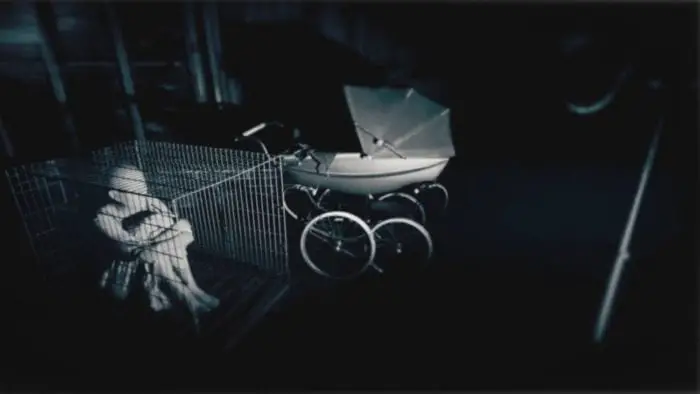
Off-camera, strange and haunting things are happening for Stanley, and images of the actresses appearing otherworldly are cut into his film with forceful static playing louder than the film, making for rising heartbeats and uneasy jump scares. Stanley does not seem to see them, commenting that the screens are just cutting in and out, but the film is talking back to Stanley, and that is how Ashurst keeps the viewer curious. When the film within the film does begin, Stanley’s film is seemingly a more open retelling of The Garden of Eden origin story. It sees Isabella go through a transformative sexual awakening through the presence of Temptation (Hazel Townsend), The Devil (Rob Kemp), and a series of deadly sins.
A Little More Flesh will quickly bring its viewer to a crossroads. Isabella’s trauma is obviously coming at the end of the movie and, given what the film has set up in the first five minutes, the viewer knows the journey is going to be brutal. Considering the information in this prologue that things will not turn out well for the character, it’s rather easy to realize where the film is heading. What ensues in the interim are the loathsome reflections of an arrogant sociopath who reviles women, often told over a satirizing tone. Two stories are being told here: one is provided by the film on-screen and the other by Stanley, who continues to support his motivations. Stanley admits to having a crush on Isabella, and when his advances are met with rejection, his ego viciously changes the nature of the film. It requires that the actresses show “a little more flesh” onscreen and turns an outwardly facing arthouse drama into an absolutely challenging torture film. Over the next seventy-five minutes, Isabella is put through the wringer.
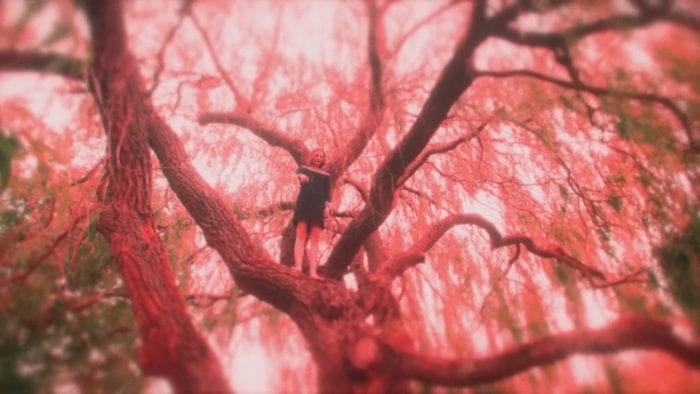
This movie will not be for everyone. I do, however, feel that A Little More Flesh is important as it sarcastically addresses films that we have come to love from terrible people. Ashurst purposefully addresses the reason for the existence of cancel culture and how it may be hard for some of us to watch films by certain directors or actors after having the information that we do about controversial figures or what happened during the filmmaking process. This is something Cursed Films did for me with John Landis’ portion of The Twilight Zone movie and also HBO’s recent Allen v. Farrow. A Little More Flesh serves to shine a light on how we as moviegoers, watchers, and collectors feed into the culture by attempting to separate the art from the artist. We see how God’s Lonely Woman is being anticipated on Blu-ray within the film with his abhorrent director’s commentary attached. A Little More Flesh is an achingly uncomfortable, stomach-turning experience designed to make us question our support of bad people. Luckily, Ashurst builds the film toward a cathartic, albeit unpleasant, finale.
Personally, I enjoyed the objections the film raises through one hostile director’s brash manner and whimsical “I can’t believe he just said that” presentation. Stanley’s unrepenting attitude causes him to become so unlikeable that the finale, though justified, seems like a light punishment. Though the film is more disturbing than scary, it is extremely horrifying, even if it doesn’t end up packaged as what we consider extreme horror to be, like A Serbian Film or Cannibal Holocaust, for example. This is a very smart film packaged uniquely, and though the end is quite shocking, it’s the ideals of its director that are far more haunting, especially when you consider him saying things like “it was the ‘70s,” as if that excuse somehow makes the behavior more acceptable.
Though the film does have its moments of brilliance, I also found that it had some long-windedness to it, as well. The diabolical nature of Stanley’s abuse toward Isabella is notated in increasingly awkward and violent scenes within God’s Lonely Woman, as well as racist overtones toward actor Patrick Steeds (Dane Baptiste). The problem is that the visual aspects of the medium are sometimes forgotten in the focus on the commentary. Scenes run on for a bit too long, like Isabella dancing after she’s unknowingly given LSD by Stanley, or Isabella and The Devil having a conversation where it appears that The Devil is screaming at her for an extended period. Regardless, A Little More Flesh is as important as it is unnerving, and that fits in with the turning tide of the film industry by making us think about the kind of people we want to support in the medium.
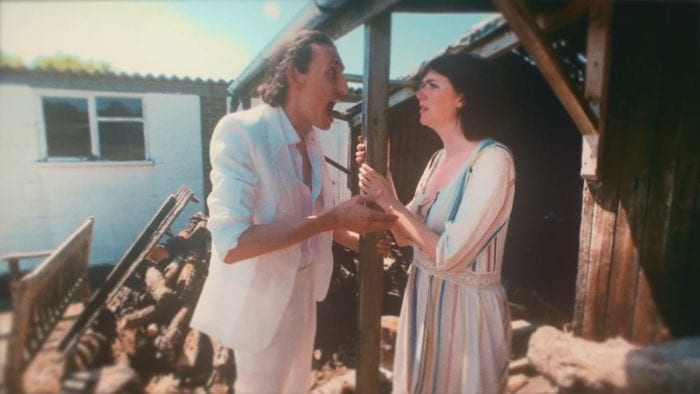
Shockdown Saturdays are continuing next week with Browse and Dementia: Part II, along with Strong Language Violent Scenes Live Podcast for their final weekend. If you’d like to be a part of the festival, all you have to do is become a member of the festival’s Facebook page and click the links in the announcements section when the films become available on Saturday. All showings are based on local time in Soho, England—check with their website and Facebook page for times (often they leave the links open until Sunday at midnight). The festival is free, but Soho Horror Film Festival is operating solely on viewer support donations and entirely without sponsors. So, if you like what you see, I’d strongly encourage you to support them so we can all indulge in future events.



